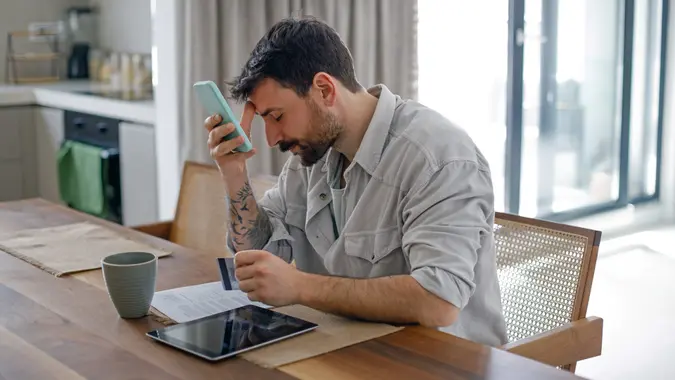Should I Get a Personal Loan for Credit Card Debt?

Commitment to Our Readers
GOBankingRates' editorial team is committed to bringing you unbiased reviews and information. We use data-driven methodologies to evaluate financial products and services - our reviews and ratings are not influenced by advertisers. You can read more about our editorial guidelines and our products and services review methodology.

20 Years
Helping You Live Richer

Reviewed
by Experts

Trusted by
Millions of Readers
A personal loan can be a smart way to lower your interest rate and simplify your monthly payments — if you stop using your credit cards and commit to not adding new debt.
If you’re asking, “should I get a personal loan for credit card debt?”, here’s what you need to know about how to get a personal loan to pay off your credit cards.
Pros and Cons of Using a Personal Loan for Credit Card Debt
| Pros | Cons |
|---|---|
| Fixed monthly payments | May come with fees, e.g., origination, prepayment |
| May save money on interest | Could hurt your credit if misused |
| Helps build a plan to get out of debt | Doesn’t fix overspending habits |
Why People Use Personal Loans To Pay off Credit Card Debt
One of the most popular types of personal loans is debt consolidation. There are multiple reasons you may use a personal loan to pay off credit card debt, but the goal is the same — to save money.
For example, paying off credit cards with a personal loan can:
Consolidate Credit Card Payments Into One
Juggling multiple monthly credit card payments can eat a lot of your available income. Rolling them into a single bill will often result in considerably less spent on minimum payments.
Lower Your Interest Rate
Personal loans generally have much lower APR than credit cards. You can escape high-interest debt by paying off credit cards with a loan.
Improve Your Credit Score
One of the biggest factors of your credit score is credit utilization, which is calculated by the amount you owe on revolving lines of credit, like credit cards. It doesn’t account for installment loans. If you use a loan to pay off your credit cards, a lower credit utilization can positively affect your credit card within a month.
Converting your credit cards into an installment loan can also help you to visualize the light at the end of the tunnel. Depending on your balances, credit card debt could drag on for decades, but an installment loan confines you a fixed term.
How To Use a Personal Loan To Pay Off Credit Card Debt
To consolidate credit card debt, try the following steps:
- Examine your credit score. To qualify for the majority of personal loans, your credit score should be at least 670. Anything lower than that, and you’ll have to be extra mindful that you don’t apply for a loan that’s out of your league.
- Shop each lender’s offers. Which provides the most favorable interest rates and lowest fees? Many financial institutions will prequalify you for a loan, which will give you a peek into the type of APR and term lengths you can expect.
- Use the funds to pay off your credit cards. In some cases, a bank may pay off the cards directly instead of handing you the money.
- Avoid relying on your credit cards. Just because their balances have been lowered, it can be easy to think you’ve got more spending power. However, you could end up in a worse situation if you’re not careful.
Who Should Consider a Personal Loan for Credit Card Debt?
You should consider a personal loan for credit card debt if you:
- Struggle to pay down the principal on high-interest credit cards
- Want a clear and predictable payoff timeline to your debt
- Are committed to not racking up new debt with your newly zeroed-out credit cards
While not always possible, opening a personal loan is ideal for those who have good credit. That’s how to ensure the lowest possible interest rates and the highest amount of money.
Who Shouldn’t Use a Personal Loan for Credit Card Debt
You shouldn’t use a personal loan to pay off your credit card debt if:
- You’re likely to keep over spending on your credit cards.
- The APR you receive is higher than what you’re currently paying on your credit cards.
- You can transfer all your credit card debt onto a 0% intro APR credit card.
If you can’t qualify for a personal loan to cover the entirety of your credit card debt, you should make sure that opening a new loan won’t increase the minimum payment you’ll be making each month.
Keep in Mind
Spending money isn’t a bad thing. In fact, it’s a great way to build credit, but only if you’re spending responsibly and staying on budget.
Alternatives to Personal Loans for Credit Card Debt
Personal loans aren’t the only way to eliminate credit card debt. No matter your situation, there are things you can do to ease some of the debt. For example, you can:
Open a 0% Intro APR Credit Card
You can transfer your current debt to a credit card that offers an interest-free window, which can be up to 24 months, depending on the card you choose, such as the U.S. Bank Shield™ Visa® Credit Card. This will let you throw as much money as possible toward the principal, helping you to lower your balance dramatically faster.
Work With a Credit Counselor
If you’re unsure how you’ll ever get out of debt, a credit counselor can work with you to share the most viable options.
Initiate a Debt Management Plan (DMP)
Debt management plans can be more drastic, but it’s a great option if you need to escape debt.
In this case, a counseling agency will work with your creditors to negotiate your debt. The agency will roll all your balances into one monthly payment. Most of the time, you’ll have to close the credit cards that the agency negotiates on your behalf.
Negotiate Directly With Creditors
Even if you succeed in lowering your interest rates or amounts owed after negotiating with creditors, this will understandably raise red flags for your lender. This may affect decisions they make about you in the future. They’ll also likely report to the credit bureaus that you’ve negotiated down your balances, which can hurt your credit score.
FAQs About Using a Personal Loan to Pay Off Credit Cards
Not sure if a personal loan is the right move for your credit card debt? These FAQs can help you decide.- Will a personal loan hurt or help my credit?
- When it comes to paying off your credit cards, a personal loan will almost always help your credit. That's because your credit utilization will drop, causing your credit score to rise.
- Can I still use my credit cards after paying them off?
- Yes, you can still use your credit cards after paying them off, but you should never swipe for something you can't afford. If you maintain your old habits, you could find your credit cards maxed out again — on top of having an expensive personal loan.
- How fast can I pay off credit card debt with a personal loan?
- Depending on how much debt you have and how large of a loan you can be approved for, you could pay off your credit card debt with a personal loan overnight.
- What happens if I miss a loan payment?
- If you miss a loan payment, you'll likely get dinged with a late fee. If your payment is over a month late, your credit score will likely see a dip. Payment history accounts for 35% of your credit score. It's the most important aspect of maintaining healthy credit.
Our in-house research team and on-site financial experts work together to create content that’s accurate, impartial, and up to date. We fact-check every single statistic, quote and fact using trusted primary resources to make sure the information we provide is correct. You can learn more about GOBankingRates’ processes and standards in our editorial policy.
- MyCreditUnion.gov. "Debt Consolidation Options."
- USDA. 2024. "USDA Launches Online Debt Consolidation Tool to Increase Farmer, Rancher Access to Capital."
- MyCreditUnion.gov. "Credit Scores."
- Discover. "Debt Consolidation."
- Consumer Financial Protection Bureau (CFPB). "What Is a Credit Score?"
- Federal Trade Commission (FTC). "How to Get Out of Debt."
- MyCreditUnion.gov. "Managing Debt."
 Written by
Written by  Edited by
Edited by 






















